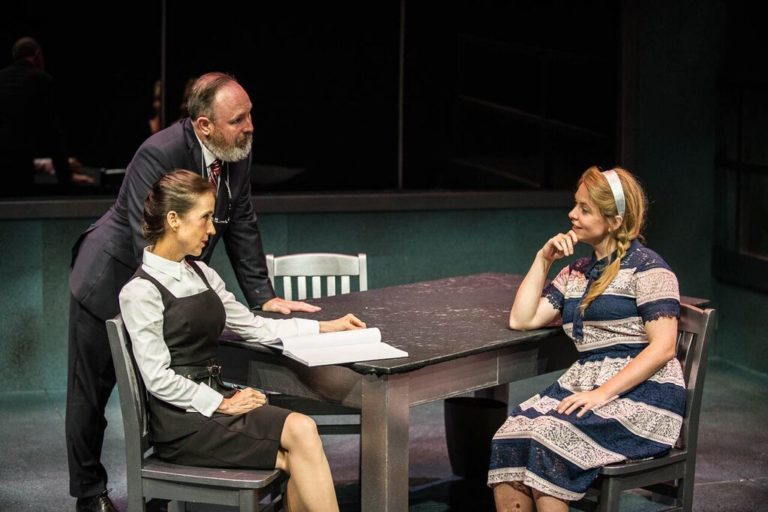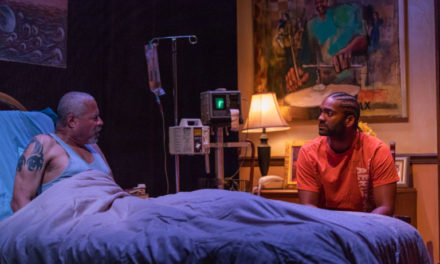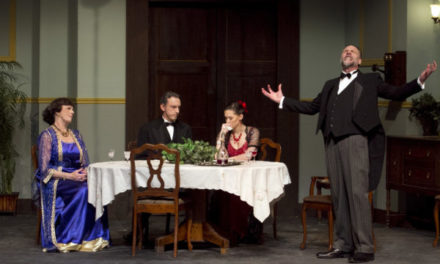Kate Hennig’s The Virgin Trial is a must-see gritty political crime drama that upends expectations of innocence and victimhood
The Great Canadian Theatre Company’s production of The Virgin Trial by Canadian playwright Kate Hennig is a stunning gritty political crime drama that centers on a treason scandal in the young Queen Elizabeth I’s life that forces the audience to grapple with ideas of innocence and victimhood in a nuanced way.
The teenage Bess—played wonderfully by Lydia Riding—is still years away from the crown but full of ambition. As the play opens, the princess is under investigation for her possible involvement in a plot to murder her brother, King Edward, perpetrated by her close ally, the dashing Thom.
Elizabeth is only a teenager in this play, but already she is showing the single-headed determination that will someday make her the Queen of England. Her ambition, though, is ruthless. At first, Bess seems to be the victim, and the audience naturally sympathizes with this young woman who seems to be as much on trial for her blossoming sexuality as for criminal charges. It has all the makings of a masterful play with a powerful—albeit simple—feminist message, but Hennig never lets the play become that simple. That is what makes The Virgin Trial truly terrific—the lines between innocence and guilt are blurred; the feminist icon of Bess is no sparkling role model; and the play never comes down too hard on any one side. Hennig walks a fine line between opposing forces, but she walks it well.
The title of the play reveals a lot. Virginity and the trial create an uneasy balance throughout the play. On one hand, Bess is being interrogated for her connections to an attempted act of high treason—it’s a legitimate, criminal trial—but the young royal is also being interrogated for her perceived sexual misconduct. The ruthlessness with which the sharp, bitter Eleanor comes down on Bess for her mother’s sexual infidelity and her perceived wantonness bring the audience to sympathize with Bess. We are forcibly reminded of the exacting standards women are held to regarding their sexuality.
But nothing is ever cut-and-dried in this play. Yes, Bess is being penalized for growing into her sexuality, but she’s a teenager and her lover is in his forties. Hennig doesn’t let it become a simple case of a man preying on a younger woman, though. Bess wants the older Thom, maybe more than Thom wants Bess.
The play seems to center on two words: obsession and innocence, though both have dual meanings. Throughout the play, the young Elizabeth is trying to maintain her criminal innocence while striving to maintain an image of her sexual innocence and purity. The problem is that she isn’t innocent, in either way—she largely initiates the scandalous relationship with the much-older Thom, and she certainly had a role to play in the treasonous plot against King Edward. As a modern audience, we might be against targeting Bess for her love affair, but it cannot be denied that her political ambitions do not exclude murder.
But Elizabeth is a force to be reckoned with, and if she says she is innocent, she’s innocent—in every way. That’s where her obsession comes in, and again, it’s a term with two meanings. Although Bess seems to be a rather innocent at first, the audience quickly realizes her ruthless ambition. Her strong political conviction seems to make her something of an early feminist icon, a woman ripping through the patriarchy and male-centric power dynamics to make herself queen. But this young Elizabeth isn’t exactly a shimmering hero—to become Queen, her family must go. Absolute power, and as a woman too, but at the price of fratricide, sororicide, and destroying those close to her.
Bess’ obsession with power mirrors her obsession with a carefully crafted self-image of sparkling purity and virginity. As we increasingly try to erase the idea that a woman’s worth is tied to her sexual modesty, Bess offers us a bit of an uncomfortable figure—she, after all, makes herself into the Virgin Queen. We may balk when Eleanor savagely attacks Bess for being a sexual deviant, but Bess herself ties her self-image up in her own sexuality.
The Virgin Trial’s take on the young Elizabeth dealing with the aftermath of a sexual scandal could have easily been a simple feminist take on how we police women’s bodies. But Hennig never makes it that simple. Everyone is a bit of a victim, but everyone is guilty of something too.
This article first appeared in Capital Critics’ Circle on September 15, 2018, and has been reposted with permission.
This post was written by the author in their personal capacity.The opinions expressed in this article are the author’s own and do not reflect the view of The Theatre Times, their staff or collaborators.
This post was written by Ryan Pepper.
The views expressed here belong to the author and do not necessarily reflect our views and opinions.


















